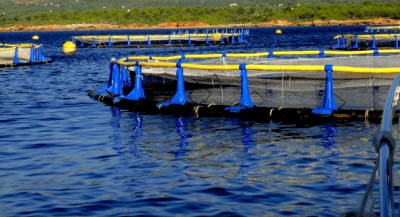A DOMESTIC appetite for faba beans from the aquaculture industry in particular is keeping their values buoyant, despite lacklustre interest from Egypt, traditionally the pulse’s biggest export market.

Aquaculture: farming in water. image;FAO
One of Australia’s major processors of faba beans is Conqueror Milling at Cootamundra on the south-west slopes of NSW.
Conqueror Milling general manager, Alistair Pennington, said while ruminants also consume fabas milled or kibbled at the plant, the aquaculture industry is its biggest customer.
“Faba beans are a core raw material for aquaculture. They are chasing them for their starch, and when they add it feed, it sinks at a slower rate, which decreases pollution problems for aquaculture and gives the fish a better feed conversion rate.”
Conqueror is an extrusion miller of faba beans and uses steam, pressure and heat to process the pulse, which creates a density that reduces the rate at which it sinks.
Manufacturers of aquafeed generally use 10-20pc faba beans in their ration which is fed mostly to salmon, which have a feed-to-weight conversion rate of 90pc.
“That industry’s growth has been massive, 100pc growth in 10 years.”
Conqueror sources fabas locally when possible, but has trucked them from as far away as Narrabri in northern NSW, South Australia and Victoria.
“It makes sense for us to pay a premium for growers closest to us to keep the product away from export.”
Egypt’s currency problems have largely kept it out of the export market.
“That’s good for a business like ours, but it won’t stay like that.”
Mr Pennington said fabas are a preferred feed as a whole feed for sheep especially, as they reduce the risk of acidosis.
“Animals pick them up really well, and they are very dense, so you don’t have to cart as many by volume to get a lot of feed.”
Conqueror also process both types of lupin and field peas, but does not handle cereals.
“Historically, we haven’t been able to pull beans past packers in the north of NSW, but we’ve been able to do it this year.”
“DCT today is $330, up-country value is $280, I’m a consumer paying $300, and I’m still pulling last season’s beans.”
Faba bean skins get darker with age, and this cosmetic difference makes older beans less attractive to those buying for the human-consumption market.
“That’s why the export buyer will be all over new-season beans.”
Crokers has been operating the Conqueror mill for eight years, and Mr Pennington said around 80pc of its business is domestic, with pet and dairy markets also being significant.
The plant processes around 45,000t a year.
Fisheries and aquaculture
ABARES’ March Quarter 2017 outlook forecast a marginal decline in the value of Australia’s fisheries and aquaculture production in 2017/18 to A$3bn, though exports were forecast to rise reflecting an increase in the value of rock lobster exports.
Fishmeal has traditionally formed a major part of the feed input for aquaculture. Whole fish, fresh and frozen, account for around 75,000t of the feed input to the southern Bluefin tuna industry in South Australia, according to Feed Grains Partnership (FGP) 2016 report author JCS Solutions.
It said in spite of large expenditure on research into manufactured feeds, the majority of tuna are still fed baitfish, including fresh sardines and frozen fish mainly from California; a small quantity of manufactured feed was used to feed tuna.
Conversely, the characteristics of feeds with plant origin, including grains and pulses, suit salmon farming. The FGP 2016 report said salmon feeding would have accounted for around 66,000t of feed. Extruded feed manufacture for salmon is highly technical and must ensure the right pellet density and floating and sinking specifications, the report said.
More information: See more information and video detailing how Novacq prawn feed, developed by CSIRO, is helping Australian prawn farmers grow bigger, healthier prawns sustainably, faster and cheaper here.

HAVE YOUR SAY